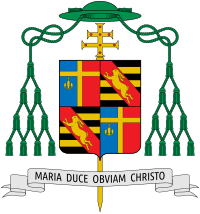Wolfgang Haas
The Most Reverend Wolfgang Haas | |
|---|---|
| Archbishop of Vaduz | |
 | |
| Diocese | Vaduz |
| See | Vaduz |
| Appointed | 25 March 1988 (Coadjutor) |
| Installed | 2 December 1997 |
| Predecessor | None (See newly erected) |
| Orders | |
| Ordination | 7 April 1974 |
| Consecration | 22 May 1988 by |
| Personal details | |
| Born | 7 August 1948 Vaduz, Liechtenstein |
| Denomination | Roman Catholic |
| Previous post(s) | Bishop of Chur (1990–1997) |
| Motto |
|
| Coat of arms |  |
| Styles of Wolfgang Haas | |
|---|---|
 | |
| Reference style | The Most Reverend |
| Spoken style | Your Excellency |
| Religious style | Archbishop |
| Posthumous style | none |
Wolfgang Haas (born 7 August 1948 in Vaduz) is the first archbishop of the Archdiocese of Vaduz in Liechtenstein. He previously held the position of Bishop of Chur from 1990 to 1997.
Early life[]
He was ordained a priest as well as incardinated in Chur on 7 April 1974. At the request of the bishop of Chur , Haas was appointed to the position of coadjutor bishop of Chur on 25 March 1988.
Bishop of Chur[]
On 22 May 1990 Haas became bishop of Chur. He was appointed by Pope John Paul II who bypassed the traditional right of the senior clergy of Chur to propose candidates to the pope, who in turn would approve one.
These clergymen, however, had proposed candidates who were considered not acceptable by Vatican officials on political and theological grounds. The pope therefore named his own candidate without taking counsel from the senior clergy. Many Catholics of the diocese rejected Haas both because of the irregular procedure of his appointment and because of Haas's conservative positions. A group of diocesan Catholics even attempted to prevent his entry into the cathedral. These tensions were never resolved, and Haas never succeeded in leading the diocese.[1]
In 1991, he made a series of controversial decisions regarding the local theological college, St Luzi Seminary, wanting only candidates for the priesthood to study there. He replaced the rector and dismissed all students who were not in formation for the priesthood. In response the Synodal Council of the Roman Catholic corporation of the Canton of Zurich cut its funding to the diocese.[2]
In March 1995, the president of the Synodal Council, Eugen Baumgartner said, "We have been waiting for a long time for the removal of Wolfgang Haas. I simply cannot understand it any more and ask myself how long must we wait for a decision from Rome. If ever there were a bishop who could not unite his diocese, it is Wolfgang Haas."[2]
Archbishop of Vaduz[]
A resolution to the tension in Chur was reached when Pope John Paul II appointed Haas to the newly created archbishopric of Vaduz in neighboring Liechtenstein. Vaduz had long been part of the diocese of Chur.
Unusual for an archdiocese, it is no longer part of any bishops' conference and has no suffragan sees assigned to it, consisting of 12 parishes and 23 priests, Vaduz is among the smallest archdioceses in the world. Since Haas' appointment the number of Catholics and clergy in Liechtenstein has increased, but slightly decreased as a percentage of the population.[3] The solution of creating a new archdiocese and "promoting" Haas to it had been negotiated by Prince Hans-Adam II of Liechtenstein.
The prince, a leading member of the Catholic lay organization Opus Dei, shares Haas's conservative political and theological views. Haas is also a strong supporter of the Priestly Fraternity of St. Peter, frequently ordaining its members.[4] As a result, some tensions continue now between Haas and non-traditionalist Catholics in Liechtenstein.[5]
References[]
- ^ Allen, John A. "Haas appointment brings high drama to tiny principality of Liechtenstein". National Catholic Reporter. Retrieved 8 July 2017.
- ^ Jump up to: a b Jonathan Steinberg, Why Switzerland? (Cambridge: Cambridge University Press, 2013), pp. 233-234
- ^ "Archdiocese of Vaduz". Catholic Hierarchy.
- ^ "Seven (+2) Ordained to Subdiaconate". Priestly Fraternity of St. Peter. February 21, 2020.
- ^ "SRF Rundschau "Unnahbarer Bishof"".
- 20th-century Roman Catholic archbishops in Liechtenstein
- 21st-century Roman Catholic archbishops in Liechtenstein
- 1948 births
- Living people
- People from Vaduz
- Bishops of Chur